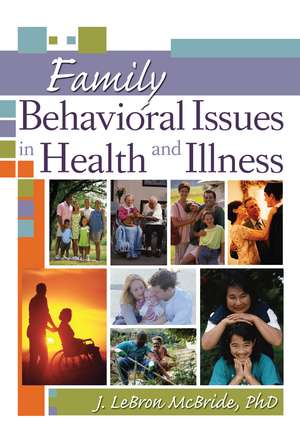Family Behavioral Issues in Health and Illness
Autor J Lebron Mcbrideen Limba Engleză Hardback – 3 mai 2006
Family Behavioral Issues in Health and Illness is a basic but thorough introduction to the impact family dynamics can have on a person’s health. Ideal as a supplemental training text for healthcare professionals, this unique book examines the connections between family and health, presenting a concise summary of family systems theory, basic family assessment, and the family life cycle. The book provides an understanding of how the patterns and systems found in a diverse range of family styles can create special health issues, and how the ability to assess and anticipate those issues can ensure the most comprehensive patient care and cost-effective management of time and resources.
As long as families continue to be the primary environment where patients learn and develop their beliefs and overall attitudes about life, it remains essential that any primary healthcare model includes a strong background in family dynamics and the critical, pivotal points of family life. Family Behavioral Issues in Health and Illness addresses the most important aspects of family to consider when providing care, presenting practical, real-life case studies that examine the resilience, strengths, and possibilities of families, as well as the problems and dysfunctions. The book looks at how significant events, such as marriage, divorce, birth, and death affect families, and how a knowledge of special family issues, including parenting, abuse, disability, and chronic illness prepares the healthcare professional to provide effective care for traditional, single-parent, multiracial, blended, adoptive, and same-gender families.
Family Behavioral Issues in Health and Illness examines:
- boundaries, roles, and rules
- triangulation
- subsystems
- scapegoating
- parentification
- healthy families
- the family genogram
- spiritual crises of family members
- infertility
- families without children
- intergenerational families
- the family in later life
- coping with alcoholism, dementia, bereavement, and/or mental illness
- and much more
Preț: 169.52 lei
Preț vechi: 206.52 lei
-18% Nou
Puncte Express: 254
Preț estimativ în valută:
32.44€ • 33.74$ • 26.78£
32.44€ • 33.74$ • 26.78£
Comandă specială
Livrare economică 24 martie-07 aprilie
Doresc să fiu notificat când acest titlu va fi disponibil:
Se trimite...
Preluare comenzi: 021 569.72.76
Specificații
ISBN-13: 9780789029430
ISBN-10: 078902943X
Pagini: 98
Dimensiuni: 148 x 210 x 13 mm
Greutate: 0.29 kg
Ediția:1
Editura: Taylor & Francis
Colecția Routledge
Locul publicării:Oxford, United Kingdom
ISBN-10: 078902943X
Pagini: 98
Dimensiuni: 148 x 210 x 13 mm
Greutate: 0.29 kg
Ediția:1
Editura: Taylor & Francis
Colecția Routledge
Locul publicării:Oxford, United Kingdom
Public țintă
Professional Practice & DevelopmentCuprins
- Foreword (Wayne S. Dysinger and June N. Dysinger)
- Preface
- Acknowledgments
- Chapter 1. The Changing American Family
- Definition
- Family Systems Theory
- The Family and Its Influence on Health
- Basic Family Assessment
- The Family Genogram
- Chapter 2. The Family Life Cycle
- The Single Young adult
- The New Couple
- The Family with Young Children
- The Family with Adolescents
- Launching Children and Moving On
- The Family in Later Life
- Chapter 3. Variations to the Family Life Cycle
- Blended Families
- Single-Parent Families
- Gay and Lesbian Families
- Families with Infertility
- Adoptive Families
- Families Without Children
- Families from Other Cultures
- Intergenerational Families
- Multiracial/Multiethnic Families
- Chapter 4. Special Family Topics
- Divorce
- Abuse
- Medical Issues and Family Life
- Chronic Medical Illness or Disability
- Dementia
- Bereavement
- Mental Illness
- Alcoholism
- Healthy Families
- Conclusion
- Resources
- References
- Index
Descriere
Family Behavioral Issues in Health and Illness is a basic but thorough introduction to the impact family dynamics can have on a person's health. Ideal as a supplemental training text for healthcare professionals, this unique book examines the connections between family and health, presenting a concise summary of family systems theory, basic family assessment, and the family life cycle. The book provides an understanding of how the patterns and systems found in a diverse range of family styles can create special health issues, and how the ability to assess and anticipate those issues can ensure the most comprehensive patient care and cost-effective management of time and resources.
